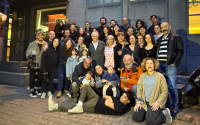by Ben Block, Worldwatch Institute Staff Writer
28 December 2009CommonDreams
Media audiences across the world took notice as Copenhagen police arrested hundreds of activists at the peak of the United Nations climate conference that ended last Saturday.
The variety of non-violent actions, from candlelight vigils to hunger strikes, as well as the sheer size of the demonstrations, served as constant reminders that a concerned public expected the conference to result in dramatic action to confront climate change.
"The standard way of doing activism is not working. We need dramatic action and personal action and to do what we can as individuals," said Anna Keenan, an Australian Youth Climate Coalition organizer. "Writing one more petition is not going to change the world."
The two-week U.N. conference may have ended in disappointment for most climate activists, who travelled from nearly every continent, but the gathering marked a historic high point for a movement that has swelled in strength and recognition in recent years.
An estimated 45,000 people attended the climate negotiations. This included greater participation from government delegations, business groups, and academics, in addition to larger turnout from campaigners. The "youth" delegation, representatives of the below-30 age group, increased its presence at forums that were once attended only by bureaucrats and scientists. Youth organizers said that their volunteers registered some 1,000 attendants, twice the participation compared to a year ago.
The activist crowds were relentless: they raised their voices during negotiation sessions, press briefings, and lunch breaks; they scattered in the corners of conference rooms and gathered in mobs to block passageways; and they screamed loudly for adaptation aid, among other demands. Activists also made subtle suggestions about the ineffectiveness of carbon offsets, for example by using tricks to show airplanes vanishing magically in the same way that carbon offsets make emissions "disappear," they said.
Negotiation leaders acknowledged that the demonstrations captured their attention.
"It's very important that you're here," said UN Framework Convention on Climate Change Executive Secretary Yvo de Boer in an address to the youth delegation. "You're taking a very strong position, you're holding leaders responsible for their decisions, and, at the least, you're making it a lot less boring."
The activists' "strong position," broadly, was a demand for climate justice. The term refers to aid that industrialized nations provide to developing countries to help them transition to low-carbon economies and adapt to damages caused by climate change. Such funding is justified, activists said, by the fact that the majority of greenhouse gas emissions are produced in the world's wealthiest nations yet the worst damages will disproportionally affect the developing world, women, and indigenous populations.
"We are the creditors, and the debtors have to pay their debt!" shouted Wahu Kaara, a coordinator with the Kenya Debt Relief Network, at a press conference. "Not anymore are our lives going to be sacrificed at the hands of market economies for their profit!"
Activists rallied around Tuvalu, in particular. The future of the low-lying Pacific island nation is threatened by rising sea levels and more-extreme weather events. Demonstrators pressed negotiators throughout the conference to "listen to Tuvalu" and support the nation's demand that global temperature rise be limited to 1.5 degrees Celsius rather than the 2-degree rise accepted by wealthier nations.
Keenan, the Australian climate activist, was one of several participants who fasted during the lead-up to the conference and throughout the negotiations. She, as well as Sara Svensson of Sweden, denied themselves food for 43 days.
"It's a way of showing leaders that we want more, we need more," said Matthew Ballé, a French solar panel installer who heard about the fast in November, joined the next day, and continued the protest action through the conference.
Even when the United Nations reduced access to the conference hall to keep the number of government delegations, media, and non-governmental observants within building capacity, activist organizers continued to attract attention through a series of marches and sit-ins.
"If people can't get into the negotiations-indeed, we are getting kept out-then the only way we can express ourselves is right there, on the streets," said Beverly Keene, co-coordinator of Jubilee South, a network of social movements, who organized a march from downtown Copenhagen to the conference hall, where police prevented the protesters' access.
Some analysts have speculated that the antagonistic nature of the protests, as well as the constant distractions caused by demonstrators inside the conference hall, may have further alienated the climate movement from the politicians and negotiators they were attempting to persuade. The violence of some climate protestors may have also further politicized the climate debate, at the cost of progress, some have argued.
But the restrictions on civil society suggest that the movement has grown to the point that leaders have become intimidated, said Bill McKibben, a leading U.S. environmental author and activist.
"At Kyoto, there was no need to lock civil society out of the conference room because there was not enough civil society to lock out," McKibben said. "Now there is. Now there's something for them to be scared about."
As the negotiations drew to a close, many of the remaining activists and organizers gathered for a climate justice "vigil." The somber meeting, in honor of the lives lost due to climate change, also served as a rally to uplift the mood of a movement that felt somewhat trapped in a losing game.
"We've felt a lot of disappointment, but within a few years we've mobilized world leaders-110 heads of state sitting at a table talking about climate change-that is incredible," said Deepa Gupta, co-founder of the Indian Youth Climate Network. "As long as there is hope in the world, there is inspiration. As long as there is inspiration in the world, there is change. And we will defeat climate change."
In addition to the crowd of demonstrators who filled the streets of Copenhagen during the riot protests-estimates range from 25,000 to 100,000 protestors, according to organizers-some 5,000 people worldwide volunteered to join the climate fasters for a day without food, and 12 million people signed a petition by TckTckTck, a partnership of several environmental and social welfare groups at the Copenhagen summit, to demand a legally binding treaty.
"The result has not been the treaty we need, but we were never so naïve to think we would get it," said McKibben, organizer of the 350 movement, which coordinated 5,200 rallies in 181 countries in October to demand climate action, at the vigil. "Power does not surrender power easily. Privilege does not surrender privilege easily. It takes people like you who press."






